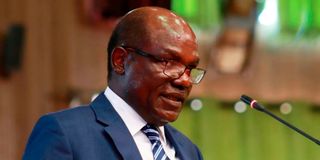Chebukati blames police for security lapse in mini-polls

Wafula Chebukati, the chairman of the Independent Electoral and Boundaries Commission (IEBC).
After the violence that marred recent by-elections, the chairman of the Independent Electoral and Boundaries Commission (IEBC) Wafula Chebukati is accusing the police of being a let-down in electoral security.
This comes as it emerged that the commission has forwarded a report on the Juja by-election to the Office of the Director of Public Prosecutions (ODPP), accusing Kiambu Governor James Nyoro and the Woman representative Gathoni Wamuchomba of electoral offences requiring prosecution.
In a hard-hitting speech at an event hosted by the Elections Observation Group (Elog) on Friday evening, Mr Chebukati cited instances of police officers deployed during the recent by-elections of refusing to take lawful orders from the commission, last-minute transfers of senior police officers just days to a by-election and under-deployment of police officers to polling stations.
Request for meeting
Moreover, Mr Chebukati stated that the Inspector-General of Police Hillary Mutyambai has lately refused to respond to their request for a meeting to chart the way forward in stemming violence during future by-elections.
“One of the greatest challenges that is currently facing the electoral process in Kenya is lapses in election security that have given rise to electoral violence as witnessed in recent by-elections. This flies in the face of the principle of free and fair elections, which are free from violence and intimidation as envisaged in Article 81(e)(ii). The question we must seek to answer is where or in whom does the duty and responsibility to prevent or contain electoral violence and intimidation lie,” said Mr Chebukati.
The Elog event was to mark the transition of power from the former chairperson Regina Opondo to the incoming chair, Anne Ireri.
Police officers deployed during elections are designated as election officers by the Elections Act, 2011. As election officers, the law provides that they will be subject to the direction and instruction of IEBC.
Police watched as violence occurred
However, the IEBC chairman says that in the recent by-elections, the commission has had experiences where the police officers deployed for the conduct of the mini-polls just watched as violence occurred within the polling and tallying areas. According to Mr Chebukati, the officers “refused to take lawful instructions from the commission to contain chaos and equally refused to take action to prevent occurrence of violence.”
IEBC has recently conducted by-elections in Ganda, Dabaso, London and Rurii wards, and Msambweni, Matungu, Kabuchai, Bonchari and Juja constituencies.
All the by-elections have been characterised by violence, arrest of agents of some parties, and claims of bribery. Following the Bonchari and Juja by-elections in particular, ODM leader Raila Odinga uncharacteristically issued a statement criticising the police and some unnamed “government functionaries” for the violence that occurred.
"What we have witnessed in the by-elections in Bonchari and Juja is an abuse of police powers and an arrogant display of impunity by a few overzealous and bellicose government functionaries," he said. "Security forces exist to serve the people and not the interests of those out to conduct political experiments," he added.
Moreover, some MPs allied to Deputy President William Ruto as well as ODM legislators have accused Interior Cabinet Secretary Dr Fred Matiang’i of instigating the violence in unsuccessful attempts to help Jubilee candidates win.
Two centres of command
Elog National Coordinator, Mulle Musau, says the problem that exists is the failure of the security agencies to cede to IEBC the command of the officers seconded to them for the purposes of an election.
“What we have been seeing is that even after being seconded, there have been two centres of command: the Inspector-General for instance still issues orders to officers seconded to IEBC yet during an election the seconded officers should take their instructions from IEBC,” said Mr Musau.
“It does seem that there is a breakdown in that engagement with the police and therefore the IEBC chair has become frustrated because he is not getting the support that he requires from the security agencies and other offices and now he has decided to bring the issue to the court of public opinion,” Mr Musau added.
In Msambweni and Kabuchai by-elections, Mr Chebukati says senior police officers from the respective regions were transferred a day before the by-elections and without consultation with the commission.
“The commission and the National Police Service command in an electoral area usually hold planning meetings for purposes of putting in place an election security plan/arrangement. Therefore, the transfer of senior police officers in Msambweni and Kabuchai a day before the election without notice to the commission resulted in major lapses in security coordination between the commission and the police. It was a case of a new police command implementing a security plan it had not taken time to understand and without the involvement of the Commission,” said Mr Chebukati.
Senior police officers in Msambweni were swapped with those in Mombasa on the eve of the by-election which was won by independent candidate Feisal Bader, an ally of Dr Ruto.





